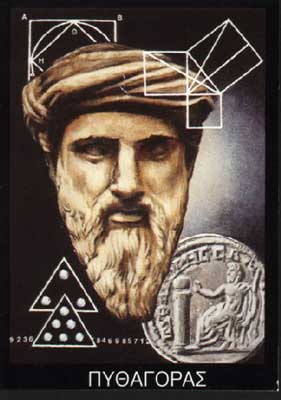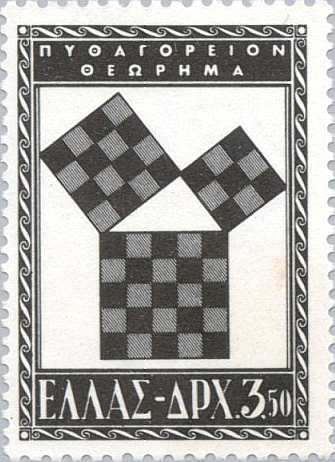
![]()

Griechische Mathematik: Pythagoras

Source

The Theorem of Pythagoras, Greek Stamp 1955 ( Scott 583, Michel 633),
actually his greatest achievement is the idea that everything can be
expressed by numbers. See also Pythagoras and his Theorem, San Marino
1983, Michel 1275, Scott 1045.
Euclid's Elements, Book I, Proposition 47
It
is to this gentleman that we owe pure mathematics. The contemplative
ideal -- since it led to pure mathematics -- was the source of a useful
activity. This increased it's prestige and gave it a success in
theology, in ethics, and in philosophy.
Bertrand Russell
When Pythagoras of Samos (Πυθαγόρας ο Σάμιος)^(569/70 – c. 475 BC) was asked by Leon a tyrant of Phlius who are you? He replied: I am a philosopher.
A friend of wisdom. And here we have the first philosopher of history
who used this name for his profession. Pythagoras was the first true
mathematician. He too, was the first person, who gave the name of
cosmos (or kosmos, kosmema i.e. a jewel) to the universe. Who was Pythagoras? According to him an encarnation of Aethalides a son of the God Hermes
who when Hermes asked him what he wants, except eternal...
[More]
Posted at: 05:22 AM | 0 Comments | Add Comment | Permalink
The area of study known as the history of mathematics is primarily an investigation into the origin of discoveries in mathematics and, to a lesser extent, an investigation into the mathematical methods and notation of the past. Before the modern age and the worldwide spread of knowledge, written examples of new mathematical developments have come to light only in a few locales. The most ancient mathematical texts available are Plimpton 322 (Babylonian mathematics c. 1900 BC),[2] the Rhind Mathematical Papyrus (Egyptian mathematics c. 2000-1800 BC)[3] and the Moscow Mathematical Papyrus (Egyptian mathematics c. 1890 BC). All of these texts concern the so-called Pythagorean theorem, which seems to be the most ancient and widespread mathematical development after basic arithmetic and geometry.
The study of mathematics as a subject in its own right begins in the 6th century BC with the Pythagoreans, who coined the term "mathematics" from the ancient Greek μάθημα (mathema), meaning "subject of instruction".[4]Greek mathematics greatly refined the methods (especially through the introduction of deductive reasoning and mathematical rigor in proofs) and expanded the subject matter of mathematics.[5] Chinese...
[More]
Posted at: 04:56 AM | 0 Comments | Add Comment | Permalink
"You do not study mathematics because it helps you build a bridge. You study mathematics because it is the poetry of the universe. Its beauty transcends mere things." --Johnathan David Farley; Orono, Me.
"Everything that can be counted does not necessarily count; everything that counts cannot necessarily be counted." — Albert Einstein
"Numbers rule the universe." Pythagoras c.550 B.C.
"The people are destroyed for a lack of knowledge." Hosea 4:6
"A teacher's day is half bureaucracy, half crisis, half monotony and one-eighth epiphany. Never mind the arithmetic."
Susan Ohanian
"Mathematics is the language with which God wrote the universe." Galileo ![]()
Posted at: 04:48 AM | 1 Comment | Add Comment | Permalink